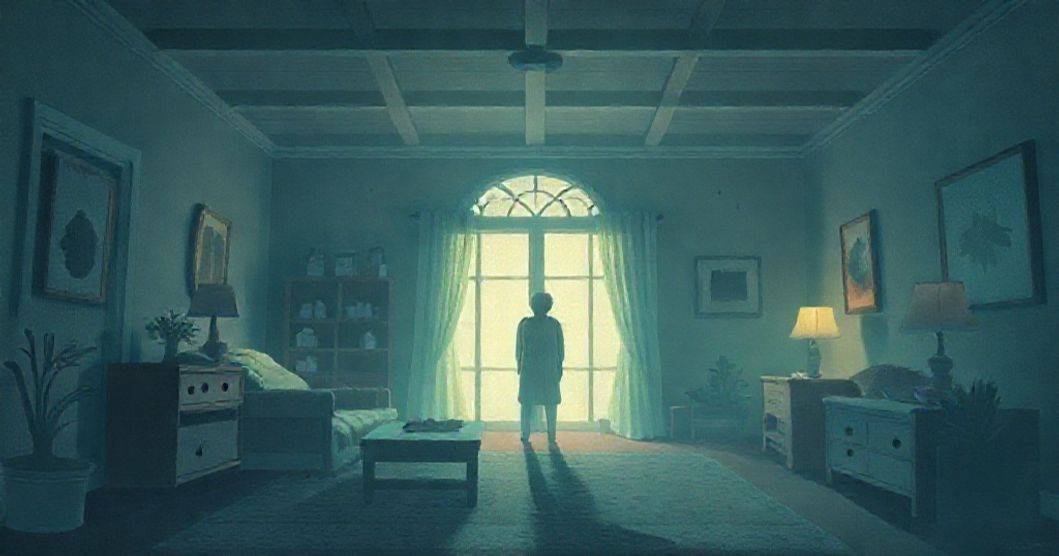Part 1: Dream Presentation
Dreams often serve as the unconscious’s cryptic messengers, communicating through symbols that bypass waking logic. For three months, a particular dream has returned with increasing clarity, unfolding in a house that feels both foreign and strangely intimate. The setting is always a white house with a vivid blue carpet, its interior bathed in eerie stillness—no visible windows, no artificial light, only the faint echo of something unseen. Outside, the world shifts between day and night without warning, casting shifting shadows that never quite reveal the house’s full outline. I move through these spaces with a curious detachment, neither afraid nor joyful, only a hollow sense of presence. The voices begin softly, like whispers carried on the wind, but they quickly escalate into angry shouts: 'Get out,' 'Why are you here? I don’t want you here.' I realize I’m dreaming—the dream logic clicks into place—and yet I struggle to leave. When I shut my eyes in the dream, the darkness swallows everything, and I force myself awake. My heart races briefly, though I never feel true fear, and the voices fade, leaving only the residue of their demands. The house never stays the same; each iteration has different rooms, different corners, but the core message remains: I don’t belong here, and I must leave. This cycle repeats, disrupting my sleep and leaving me with more questions than answers.
Part 2: Clinical Analysis
Symbolic Landscape: The Dream House and Unseen Voices
Want a More Personalized Interpretation?
Get your own AI-powered dream analysis tailored specifically to your dream
🔮Try Dream Analysis FreeThe white house without visible windows or lights functions as a powerful symbol of the unconscious mind—familiar yet unknowable, a space where the dreamer’s inner world manifests. In Jungian psychology, the house represents the self, with its interior and exterior symbolizing conscious and unconscious realms. The absence of lights suggests a lack of conscious awareness within this personal space, while the blue carpet introduces a paradox: blue often symbolizes emotional depth and stability, yet its cool hue in a house without illumination creates tension between safety and unease. The unseen voices embody the shadow self or repressed aspects of the psyche. In dreams, voices without visible speakers typically represent fragmented or disowned parts of the personality. Their angry repetition of 'Get out' and 'Why are you here? I don’t want you here' suggests a conflict between the dreamer’s conscious self and unconscious messages. The voices’ shifting tone and specific triggers (actions that provoke them) imply unresolved issues that demand attention, even in sleep.
Psychological Perspectives: Jungian, Freudian, and Cognitive Frameworks
From a Jungian perspective, this dream reflects the shadow archetype—the parts of the self we avoid confronting. The house without lights symbolizes the shadow’s unlit corners, while the voices act as shadow projections demanding acknowledgment. The dreamer’s ability to recognize it as a dream (lucid dreaming) suggests a developing relationship with the unconscious, where the mind gains agency over its internal processes. For Freud, the recurring dream might stem from repressed feelings or unconscious conflicts, with the 'Get out' messages representing unresolved guilt or forbidden desires. Cognitive dream theory offers another lens: dreams as problem-solving mechanisms, where the house’s shifting locations and exclusionary messages could indicate an attempt to process external pressures or identity issues during sleep.
Emotional and Life Context: Unprocessed Feelings and Exclusion
The dream’s emotional dissonance—racing heart without fear, feeling of emptiness despite urgent messages—points to deeper psychological currents. The three-month duration suggests these unconscious messages are persistent, signaling an unaddressed conflict. The 'Get out' messages may reflect external pressures to conform or internalized feelings of not belonging—perhaps in relationships, work, or personal identity. The dream’s setting in an unfamiliar house could symbolize a period of transition or uncertainty, where the dreamer feels displaced in their own life. The emotional detachment during the dream might protect against overwhelming feelings, but the physical response (heart racing) indicates the unconscious is trying to communicate despite conscious resistance.
Therapeutic Insights: Honoring the Dream’s Message
This recurring dream offers an opportunity for self-reflection. The dreamer should explore spaces of exclusion in waking life—where do they feel unwelcome or unsure of belonging? Journaling about the dream’s details (different house locations, specific actions triggering voices) can reveal patterns in waking life. Dream incubation techniques, such as setting an intention to ask the dream for clarity before sleep, might provide more nuanced insights. Grounding exercises before bed (breathing, visualization of safety) can bridge the gap between waking and sleeping minds, reducing the dream’s intensity. The 'Get out' messages may signal a need to release what no longer serves the dreamer, whether relationships, habits, or self-perceptions.
FAQ Section
Q: Why do I feel no fear but my heart races during the dream?
A: The heart rate increase reflects physiological stress responses to unconscious conflict, while emotional detachment protects against overwhelming feelings. This dissonance suggests your conscious mind is separate from the emotional weight of the message.
Q: What does the house without lights symbolize?
A: The dark, unlit house represents unprocessed aspects of the unconscious—spaces you haven’t illuminated with awareness. The blue carpet’s contrast highlights tension between emotional depth and avoidance.
Q: Is this a warning or a message to change something?
A: It’s more likely a message about unprocessed emotions. The 'Get out' could signal releasing what no longer serves you, while the house’s shifting locations suggests exploring different aspects of self or environment.
